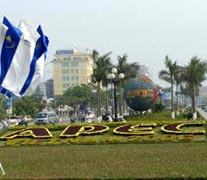| Tools: Save | Print | E-mail | Most Read |
| APEC Officials Meet to Reach Trade, Investment Consensus |
| Adjust font size: |
Specifically, the senior officials are expected to touch upon resuming of the Doha negotiation round, and series of model measures being developed for APEC economies to use as a guide in the process of negotiating Regional Trade Arrangements and Free Trade Agreements (RTAs and FTAs). The outcome of their discussions will be submitted to the 18th APEC Joint Ministerial Meeting slated for Nov. 15-16. The third APEC Senior Officials Meeting in September in Vietnam' s central region called for countries, especially those playing an important role in the multilateral trade talks, to resume the negotiations as soon as possible, considered the role of RTAs and FTAs in relation to APEC's free trade and investment goals, approved a draft action program on trade facilitation to reduce transaction costs by 5 percent in the 2006-2010 period, and discussed the APEC reform for improving operation efficiency, operation connection and operation dynamics. The second APEC Senior Officials Meeting in May in Vietnam's southern Ho Chi Minh City reached consensus on main points of a Hanoi action plan with specific measures to realize Bogor goals, adopted by APEC leaders at their 1994 meeting in Bogor, Indonesia, on free and open trade and investment in the Asia-Pacific region by 2010 for industrialized economies and 2020 for developing ones. The Hanoi action plan, to be submitted to the approaching ministerial meeting and then the APEC Economic Leaders' Meeting on November 18-19 for approval, puts forth concrete measures to implement the Busan Roadmap, a step leading to the Bogor goals. APEC leaders in 2005 developed a blueprint in Busan, South Korea, for improving trade and investment facilitation measures, regional travel, and seeking a satisfactory conclusion to the WTO Doha Development Agenda round of negotiations. As a host nation, Vietnam has initiated the APEC 2006's theme "Towards a Dynamic Community for Sustainable Development and Prosperity" with four sub-themes, including Enhance Trade and Investment with the Busan Roadmap and the Doha Development Agenda, Strengthen Economic and Technical Cooperation for Gap Bridging and Sustainable Development, Improve Secure and Favorable Business Environment, and Promote Community Linkages; and the orientation for APEC reform. From November 18-19, APEC leaders will center their discussions on two topics: trade and investment promotion in a changing world, and fundamentals ensuring dynamism, growth and sustainable development in APEC, according to the Vietnamese Ministry of Foreign Affairs. Since its inception in 1999 in response to the growing interdependence among Asia-Pacific economies, APEC has become a formidable regional forum acting as the primary regional vehicle for promoting open trade and practical economic and technical cooperation in the Asia-Pacific region. APEC currently has 21 members: Australia, Brunei, Canada, Chile, China, China's Hong Kong, Chinese Taipei, Indonesia, Japan, Malaysia, Mexico, New Zealand, Papua New Guinea, Peru, the Philippines, Russia, Singapore, South Korea, Thailand, the United States and Vietnam. The chairmanship rotates among its members, with Vietnam holding the chair this year. (Xinhua News Agency November 12, 2006) |
| Tools: Save | Print | E-mail | Most Read |
 |
| Related Stories |
|
Product Directory China Search |
Country Search Hot Buys |
